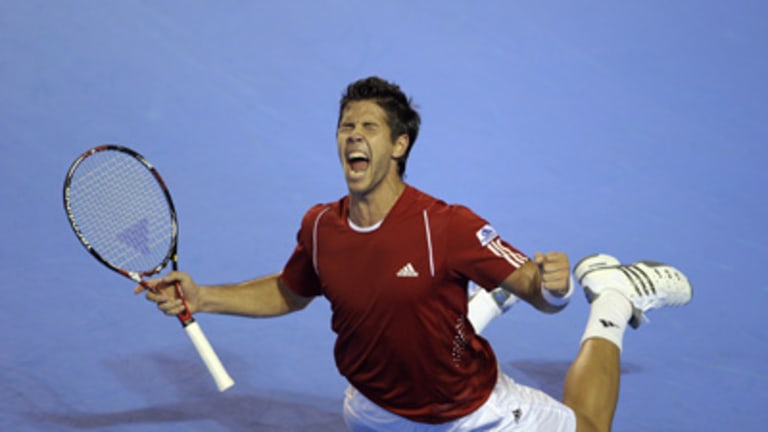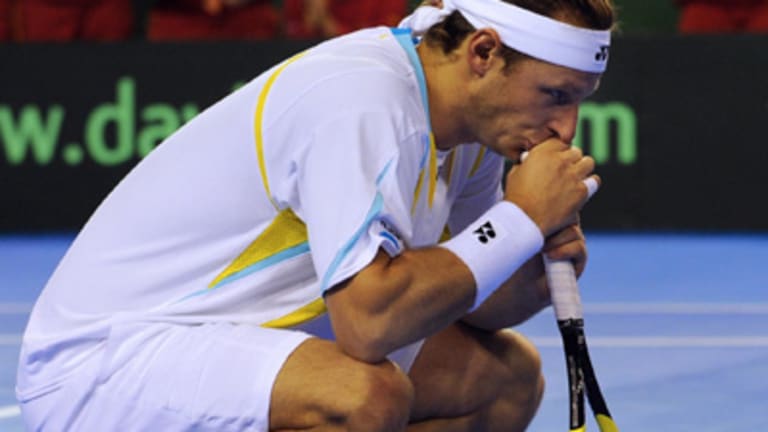Or will it forever be known as the Massacre in Mar del Plata? That depends on your point of view, of course, but clearly this weekend’s Davis Cup final in Argentina meant many things to many people.
As the fifth set unfolded between Fernando Verdasco and Jose Acasuso on Sunday, you only had to glance at the faces around the arena to see how raw the emotion was. David Nalbandian, who had seemed ready for a career-redeeming weekend after his straight-set singles win on Friday, sat mournfully with his chin on his hands. Juan Martin del Potro, who had set the disaster in motion by losing his opening singles match, stared blankly into the middle distance. Argentina’s captain, the fire-hydrant-like Alberto Mancini, stood stone-faced and tight-lipped with his hands on his hips. The home crowd fans, on their feet for most of the day urging Acasuso on, singing his nickname, “Chucho,” and giving him very specific advice—one guy in the front row would tell him to be calm before big points; another guy in the same row would advise him to get fired up—now sat stunned. When Acasuso was broken to open the fifth set, the men in the audience sat down and put their hands on their foreheads. The women sat down and put their fingers over their mouths.
On the other side of the net, Spain’s Feliciano Lopez, the surprise hero of the tie, strained forward with a look that mixed extreme hope with extreme anxiety. His captain, Emilio Sanchez, couldn’t sit down; after each point, he leaned forward, his hands pressed together under his chin, to exhort Verdasco on. The dimunitive Sanchez looked less like a Cup captain than he did an excitable Olympic gymnastics coach or a high-school drama teacher during rehearsals for the school play.
You could forgive the little man his excitement. Left for just-about-dead two days earlier, making do without their best player in front of a hostile crowd that, according to Sanchez, uttered many “things I can’t repeat here,” his team was about to pull off one of the great upsets of recent Davis Cup history. Afterward, the Spanish players talked about how the hostility of the Argentine fans had inspired them to play better. Looking back at the tie, I can point to one instance when this seemed to be true. It also happened to be the most important point of the weekend.
It came during the second rubber on Friday. Nalbandian, hitting through the relatively quick indoor court, had cleaned David Ferrer’s clock and stoked his country’s high hopes for their first Cup victory. Del Potro had kept the momentum going by winning the first set over Lopez and staving off break points in the second with gritty, on-the-run passes from behind the baseline. While the underdog Spaniard was playing more loosely and finding his range on his slice approaches, it seemed like del Potro was going to have what it took to hold him off. As they got set to begin the second-set tiebreaker, I said to Pete Bodo, who was watching with me, that this was the “last stand” for Spain. Yes, it was still the first day, but could Lopez really come back from two sets down? And if not, could Spain then win three straight rubbers, including a final one over Nalbandian? Pete agreed, this might be the whole shootin’ match. It was, but not in the way we expected.
On the opening point of the breaker, Lopez missed his first serve. The crowd booed and whistled with a collective emotion that might be described as joyous scorn—they could see Spanish blood in the water. Lopez, who has never been known as a clutch performer, walked back to the baseline, set up immediately for his second serve, and drilled an ace down the middle. This isn’t an uncommon play for him, especially at crucial moments. Lopez seems to think, correctly, that his serve is his biggest weapon so he might as well use it while he has a chance, even if he risks double-faulting. It doesn’t always work, but this time it did, and it seemed to me he had been more focused and determined than normal at that moment.
Whether the crowd had roused him or not, Lopez had quieted the Argentines with one swing and taken the sense of inevitability out of the building. He never trailed in the tiebreaker and won it 7-2. The momentum from that ace added a sense of foreboding to the tie, both in the stands and in del Potro. The third set went to a tiebreaker as well, and del Potro jumped ahead 4-2. On that point, he was presented with a putaway mid-court forehand; instead of hammering it the way he normally would, del Potro slowed down his racquet—the ultimate sign of nerves—and sailed the ball long. Lopez won the next four points and the fourth set to even the tie and remove all joy from the audience. Their fears had been realized; for the first time, they had to contemplate losing this final. All that was left for the rest of the weekend was the foreboding, which would eventually turn to self-immolating scorn as the tie slipped away.
As for del Potro, he was fighting an injury at the end of his match with Lopez, one that would keep him out of the singles on Sunday and reportedly inspire the wrath of an angry Nalbandian, who thought del Potro should have skipped the Masters Cup to concentrate on this final. But the young Argentine also let the pressure get to him against Lopez. This doesn’t mean del Potro isn’t a big-match player after all, or that the grit and resolve he showed in breaking into the Top 10 this season were mirages. While the rest of the tennis season is an accumulation of clutch wins and anxious defeats from which we can separate the courageous players from the chokers, Davis Cup is a series of individual and transitory moments. They appear suddenly, and the players who rise to them can seem randomly chosen. After all, Mark Philippoussis clinched two Davis Cups for Australia; Guy Forget did the same for France in 1991 with a win over a young Pete Sampras. This weekend Feliciano Lopez and Fernando Verdasco were the heroes, del Potro the goat. Perhaps it means that the Argentine’s rise was just a little too good to be true, and that there is still mental work for him to do. But he won’t always be a goat, just as Lopez and Verdasco won’t always be heroes.
Still, Verdasco is one for today. Subbing for Ferrer, he clinched the final against another sub, the luckless Jose Acasuso. Their five-set match was hardly a thing of beauty; if it had been played in normal tour situations, maybe on an outside court in the first round in Cincinnati, there would have been more crickets than humans in attendance. And you couldn’t have blamed the humans—both Verdasco and Acasuso dumped easy volleys into the net and sent gimme forehands flying wide on a regular basis. As announcer Barry Cowan said at one point, this was the Davis Cup final, but much of the play was “club standard.” Acasuso went for too much on his serve, spent too much time patrolling the area behind the baseline, and consistently let his opponent back into the match. Despite all this, the Argentine found himself up two sets to one.
The change came with Acasuso serving at 2-3 in the fourth. He sent a sitter backhand 10 feet wide on the first point, and hit another wildly to be broken. The air had come out of Acasuso, and out of the crowd. Verdasco said afterward that after losing the third set, he had relaxed and gone back to basics. From then on, he reined himself in, keeping the ball safely inside the lines, aiming his strokes at the faltering Acasuso backhand, and coming forward on important points to force the Argentine to pass him (he couldn't). This is the advantage that the Spanish had all weekend. Deep underdogs on the road, they played more loosely once they got behind. In all three of their winning matches, they came back after trailing by a set.

